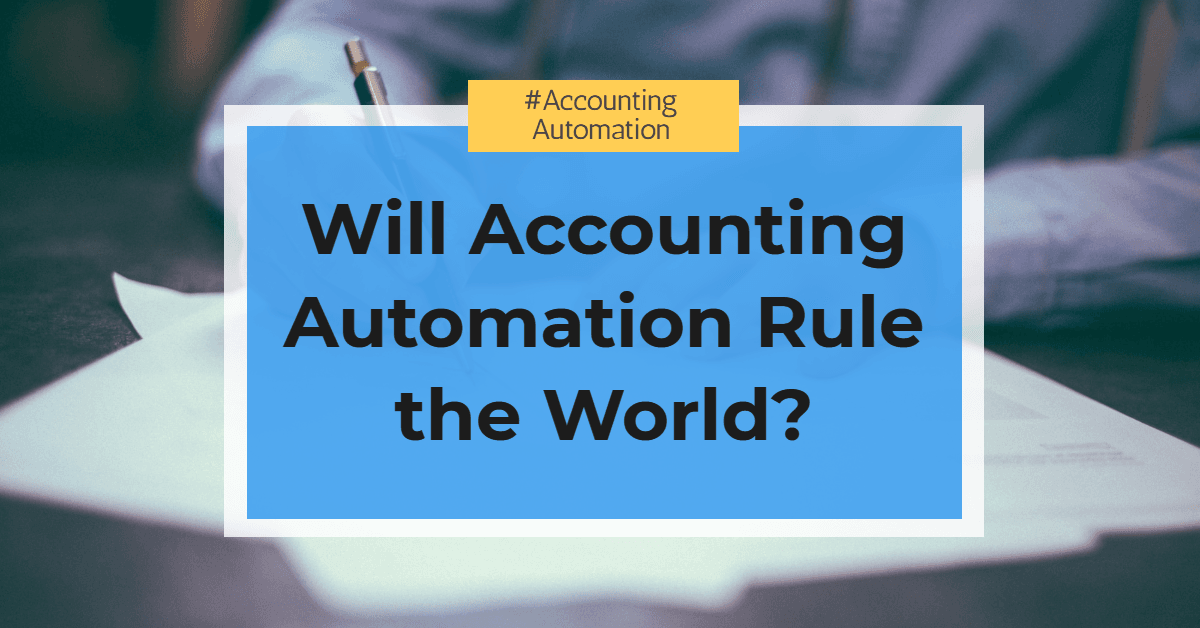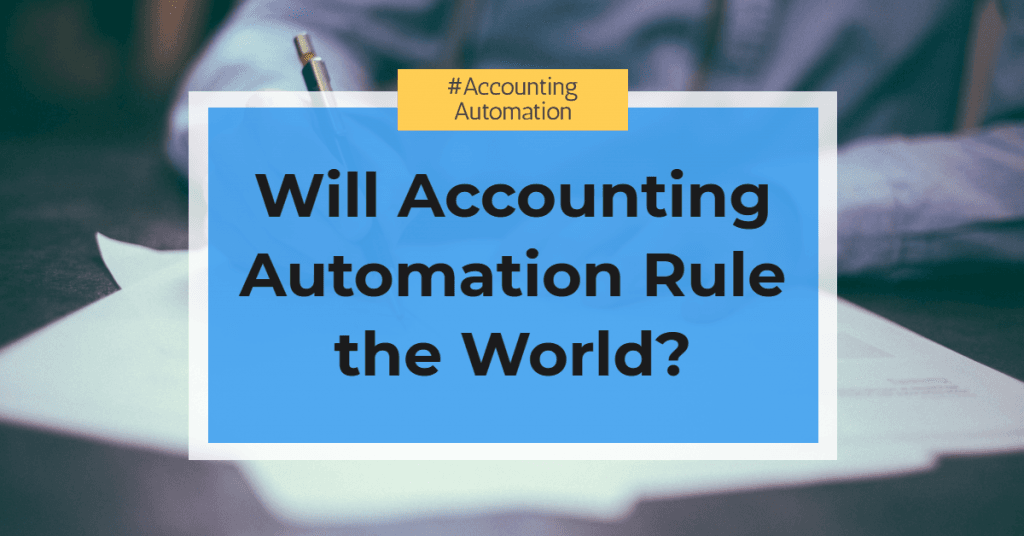Will Accounting Automation Rule the World?

We may find it hard to accept, but according to most experts, accounting automation has been hailed as the future of accounting and may very well ‘rule the world’ so to speak. Even though there are businesses still trying to make their peace with this new norm, they will have to soon turn to means that are more sophisticated than a stack of files or books, when it comes to handling their accounts and finances. The term “accounting automation” implies that business owners must get over their prevailing practices and switch to accounting technologies that will benefit both, the business owners and clients.
Contents
Will Accounting be Automated?
Benefits of Accounting Automation
Artificial Intelligence impact on accounting
Will Accounting be Automated?
With each one being entitled to their opinion you can ask yourself, “what do accountants do and will accounting be automated?” and that should help come to a conclusion. Look at it this way: Manual accounting and auditing are soon becoming a thing of the past; from dumping the entire responsibility of data entry on the accountant and looking to him/her to file your tax returns are now part of the bygone day’s thanks to various accounting automation technologies.
However, If you dive deeper into the prospects of an accountant working individually even without their tax return filing duty, you would see how his/her role in the welfare and growth of a business or company cannot be disregarded. With the enhancement and increase of financial domains facilitated by an automated accounting system, the accounting automation software, such as SaasAnt Transactions and PayTraQer have made their way into mainstream accounting to improve it greatly.

Although it may seem simple to say ‘yes’ or ‘no’, there is no one-word answer to the question as experts differ on the conclusion with some saying that an accounting system automation is a 90% possibility and others saying it can only be automated by up to 50-60%.
Therefore, a modern accountant can now step out of their constraints and do more than just the basics due to an accounting automation system; they can even take up the role of a real-time business advisor, guiding the company through monetary policies and pointing their clients towards success. The future of a regular accountant needs to be thought of from a critical-thinking point of view.
Now that you have a clear answer to the question “what do accountants do?” or “what does their future look like?”, you will agree that although accounting automation is likely to be automated, it will need a professional pulling the strings.
Benefits of Accounting Automation
A growing business means an increased workload, and therefore accounting tasks become increasingly difficult to handle manually. Here are several accounting automation benefits that describe how an automated accounting system will help you to build a profitable business:
1. Increases productivity
When you use automated accounting software, bots begin taking charge, and unlike humans, the software does not need to rest. It can run 24 hours, 7 days a week, and throughout the year. This will increase productivity for your business at a rapid pace.
2. Boosts Efficiency
When accounting processes are automated using automated accounting software, the bots can enter data, scan through multiple pages, verify transactions, and do much more than you can, in a matter of seconds. A job that would otherwise take 4-5 To employees a whole day to complete.
3. Budget-Friendly
Spending money on in-house accounting services can cost more than you prepared for. As a business owner, you can save more money by using accounting automation software. The money you save can be reallocated for business development purposes.
4. Increases security
Many businesses deal with a fair amount of confidential accounting data. Some businesses end up going through a lot of legal hassles due to loss of data and ensuring that their workforce stays compliant with the business’s confidentiality rules and regulations. With accounting automation software in place, all these hassles can be avoided.
5. Consistent with compliance
The finance industry needs to be compliant on a lot of tax-related rules and regulations among others. Any non-compliance could be severely penalized and might even lead to large fines and penalties. As a business owner or company, you would want to avoid that trouble. With the right accounting process in place, it is easier to adhere to compliance.
6. Improves customer base
By automating the labor-intensive parts of your business through accounting automation software, the workforce can be put to better use like giving better customer support to the existing customers and increasing the chances of success for your business. This hands-on customer service, leaves customers feeling valued, and hence you benefit greatly as a service provider, building a regular customer base.
Artificial Intelligence impact on accounting
Artificial Intelligence (AI) is no longer a thing of sci-fi. It is transforming the finance and accounting process with advancements that eliminate the need for manual tasks. Thus, freeing accountants and other finance professionals to do higher-level jobs such as lucrative analysis and business counseling for their clients. Here are some areas in accounting where Artificial Intelligence has begun to have an impact.
1. Forecasting solutions
Helping businesses forecast their finances is an extremely valuable element offered by accounting practices. With AI being integrated into accounting software, accounting professionals will be able to provide a comprehensive and accurate insight to their clients without manual heavy lifting and number crunching to create reports.
On a daily basis, professionals will be able to quickly and easily access the latest and most accurate reports or forecasts that can help form a closer and more useful relationship between accountants and business owners.
The ability of this AI-powered automated accounting software to program itself based on the data it encounters means it is able to learn from what an accountant does and make its own suggestions or act entirely autonomously. This is known as ‘Machine learning’ and it’s already everywhere, from the predictive text, speech recognition, and so on.
This is why AI is coming to the foreground in accounting now, because technology such as cloud storage means all the data can be collated and is accessible at any time, rather than being hived off within systems that aren’t connected.
2. Smart assistant.
If you are an accountant or business owner who feels like turning off your phone, shutting down your computer, and going home for the day due to the long list of accounts you have to go through, you’re not alone. Fortunately, AI might be able to give you a helping hand.
If you have used Apple’s Siri, Google Assistant, or Amazon’s Alexa you already know what a smart assistant is. However, now there are smart assistants that can be used in accounting as well. If you’re an accountant you will be able to ask for details on payments account and so on, while it does the rest.
Smart assistants come in two types: natural language bots and scripted bots.
Scripted bots or chatbots have been around for a while now. They’re easier to build and mostly used for mobile engagement strategies, so you are more likely to encounter them on a website. They keep an eye out for key phrases and aim to provide a response that is ready-made.
Natural language bots are also called smart assistants and this plainly means they’re more sophisticated. These bots often involve accurate human voice synthesis and speech recognition, making them apt for responding to natural language queries. What makes them better is, these smart assistants learn more through continuous use.
3. Automatic tagging and allocation of transactions
The following areas where AI will help your accounting practice or business are also enabled by machine learning. Saving you time when it comes to correctly tagging transactions and assigning them to the right account ledger. In other words, your AI-powered accounting software will learn from the previous tagging, made according to rules that the accountant is aware of.
Speaking of transactions, intelligent software like PayTraQer makes your company’s bookkeeping hassle-free by automatically syncing PayPal, Stripe, or Square with your QuickBooks account. This means, as an accountant or business owner, you don't have to spend hours-on-end feeding sales, fees, and expenses into QuickBooks. PayTraQer does the work itself by floating your real-time transactions into your QuickBooks account without manual interference. Once it has been set up, let it handle things while you unwind or focus attention on other parts of the business.
Thanks to innovative software like PayTraQer, in the years to come, technology’s ability to discover rules and plan predictively will help remove a significant part of an accountant’s daily workload.
4. Anomaly detection
Computers thrive on data, so naturally, when AI is applied to massive amounts of data such as the yearly ledgers and other company files, there are obvious benefits. Accountants will be able to discover any anomalies that exist, making the process much quicker with significantly less effort.
For example, if an audit is required, it will be possible to audit the complete data rather than just a sample, without the huge resources typically required for a “full” audit.
5. OCR solutions
Optical character recognition (OCR) isn’t new but AI has enhanced its accuracy greatly and opens it to new scenarios in terms of usage.
While extracting information automatically from documents has always been possible, there was a requirement for a person to point out where the data was located to the OCR software, this also meant the document layout couldn’t be modified without further instructions.
A printed receipt for purchase is full of numbers and computers work based on numbers, but they’re not all equal. Some are particularly important to an accountant like the date, the total amount, and perhaps the credit card number from which the purchase was made.
The human eye can instantly identify the difference between these numbers without even thinking but until now, those numbers were indistinguishable to a computer. With the application of AI to OCR, the software is now able to recognize various document types, such as receipts, invoices, or other financial documents. Salient data can thus be extracted to allow information to be processed by the software rather than manually even if the software hasn’t read a receipt like that previously. This significantly reduces manual effort and time needed to allocate and assign information.